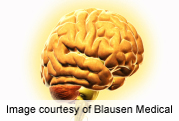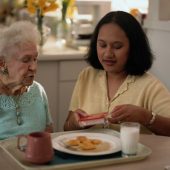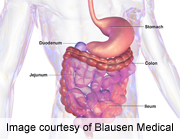healthnewslink
Seniors Newsletter
July 16, 2012 |
| In this Issue |
|
|
|
|
Diet, Weight Loss Ease Menopause Symptoms: Study
Large trial shows night sweats, hot flashes were reduced or eliminated with low-fat dieting
 WEDNESDAY, July 11 (HealthDay News) -- Menopausal women who lose weight eating a low-fat diet rich in fruits and vegetables could reduce or eliminate their hot flashes and night sweats, a large new study suggests.
One reason the researchers looked at weight loss as a way of dealing with menopausal symptoms was because of long-standing research linking hormone-replacement therapy to heart disease and breast cancer.
"We wanted to see if this could be an alternative to hormone therapy," said lead researcher Candyce Kroenke, a research scientist at Kaiser Permanente's Northern California Division of Research in Oakland.
"Indeed, women who lost weight in the context of this healthier diet -- decreasing fat, increasing whole grains, fruits and vegetables -- were significantly more likely to reduce or eliminate symptoms," she added.
Reduced hot flashes and night sweats, the key menopausal symptoms, were seen in both overweight and normal-weight women who lost weight, Kroenke noted.
And the reason for that is fairly simple, she said: Fat tends to retain heat and losing weight helps the body dissipate heat more easily.
The report, which was published July 11 in the online edition of Menopause, involved data on more than 17,000 women who took part in the Women's Health Initiative study.
The women with menopausal symptoms who were on a low-fat diet rich in whole grains, fruits and vegetables, who were not taking hormone-replacement therapy and who lost at least 10 pounds in a year were more likely to see night sweats and hot flashes reduced or disappear after a year than did women who maintained their weight (the "control" group), the researchers found.
Dr. Jennifer Wu, an obstetrician/gynecologist at Lenox Hill Hospital in New York City, commented that "this definitely goes along with the idea that good diet and exercise and losing weight contribute to general health."
And, she added, "It's a quick and easy fix for hot flashes and night sweats."
Wu noted that doctors are still reluctant to offer hormone-replacement therapy even though it works. "This is a low-risk fix," she said.
"I think it will work for some patients, and patients may only get a partial relief of their symptoms, but any help is good," Wu pointed out.
"Diet and weight loss is a healthy habit that will hopefully help menopausal symptoms. There is very little downside to doing it," she added.
Another expert agreed.
"Adopting a healthy diet is always a good idea," said Samantha Heller, a nutritionist, exercise physiologist and clinical nutrition coordinator at the Center for Cancer Care at Griffin Hospital in Derby, Conn.
"Healthy foods, including vegetables, soy, whole grains, legumes, nuts and fruits, decrease the risk of many chronic diseases and can improve health and well-being considerably. In this case, along with weight loss of 10 pounds or 10 percent of body weight, women who made healthy dietary changes tended to have decreased symptoms of hot flashes and night sweats," Heller noted.
"This study also highlights the positive effect of ongoing nutrition education by registered dietitians," she added. "Women in the intervention group, who were counseled by registered dietitians, were three times more likely to lose weight than women in the control group. A big factor in unsuccessful weight loss attempts is people not knowing how or where to begin. Nutrition counseling takes the guesswork out of creating a healthy lifestyle and helps motivate and empower people to stay on track."
The research was published just days after a coalition of leading medical groups concluded in a joint statement that hormone-replacement therapy can be useful and safe for many women suffering from the symptoms of menopause.
The coalition includes 15 medical groups, including the North American Menopause Society, the American Society for Reproductive Medicine, the Endocrine Society and the American Academy of Family Physicians.
More information
For more information on menopause, visit the U.S. National Library of Medicine.

|
Timeline Detected for Rare, Early Alzheimer's
Biochemical changes start more than 25 years before symptoms, researchers say
 WEDNESDAY, July 11 (HealthDay News) -- Changes in compounds found in spinal fluid may identify a rare form of Alzheimer's disease 25 years before symptoms appear, researchers say.
Among people genetically destined to develop early onset Alzheimer's, these biochemical changes precede the memory loss and other mental problems that accompany the brain disorder, investigators have found.
Certain genetic mutations cause this rare form of Alzheimer's, which accounts for less than 1 percent of cases and becomes evident as early as age 30.
"Certain kinds of biomarkers change years, and even decades, before the first symptoms in this rare, early form of Alzheimer's disease," said lead researcher Dr. Randall Bateman, a professor of neurology at Washington University School of Medicine in St. Louis.
"If your parents have one of these mutations, you have a 50 percent chance of having Alzheimer's," Bateman said. "If you have the mutation, it's a near certainty that you will have Alzheimer's in your 30s, or 40s, or 50s," he said.
Bateman said insights gained from this international study -- known as the Dominantly Inherited Alzheimer Network -- might also have applications for the more common form of the disease, which typically becomes apparent after age 65, robbing people of their memories and the ability to carry out the functions of everyday life.
It's estimated that more than 5 million Americans have Alzheimer's disease, and the number is expected to soar as the baby boom generation ages.
The years between the start of this slow, progressive brain disorder and noticeable symptoms may offer a window of opportunity for treatment, Bateman said.
"We now know what's changing, which enables us to start trials to prevent the disease," Bateman said. "If that works, we predict it will be an excellent model to help prevention trials for everybody."
The report was published July 11 in the New England Journal of Medicine.
For the study, Bateman's team looked for tell-tale signs of Alzheimer's disease in 128 people whose family history predisposed them to the disease.
The researchers found that a drop in cerebrospinal fluid levels of a key ingredient of Alzheimer's brain plaques -- amyloid beta -- was evident 25 years before Alzheimer's symptoms showed up. The participants' relatives who did not have the mutations had no changes in these concentrations, the study authors noted.
Brain scans can pick up Alzheimer's-associated brain plaque 15 years before symptoms occur in these early-onset patients, Bateman said. Finding these new markers might make it possible to treat the disease even earlier, thus preventing plaques from developing, he suggested.
Changes in these markers appear to be exclusive to Alzheimer's, the researchers added.
Other findings of the study, which presents a timeline for development of the disease, include:
- Increased spinal fluid levels of tau, a protein in brain cells, appears 15 years before Alzheimer's symptoms appear.
- Shrinkage in brain structures occurs 15 years before symptoms start.
- The brain's use of sugar decreases and some memory problems start 10 years before symptoms occur.
Dr. Sam Gandy, associate director of the Mount Sinai Alzheimer's Disease Research Center at Mount Sinai School of Medicine in New York City, said this is an important study.
"The most dramatic piece of data is seeing that a key spinal fluid marker starts to fall 25 years before the onset of clinical disease," he said.
When an effective treatment or a cure becomes available, this could be an effective way of identifying those who need early treatment and also evaluating the success of that treatment, Gandy explained.
If the average age at onset is 75, that would mean starting a drug at 50, he said.
Ultimately, researchers hope to see all adults undergo a spinal fluid test or brain amyloid imaging test at age 50, when other screenings such as colonoscopy are started, Gandy said.
Greg M. Cole, associate director of the Alzheimer's Disease Research Center of the University of California, Los Angeles, said it could take many years before the study's findings might be put into practice for prevention and treatment of late-onset Alzheimer's disease.
"Now that we know we can see the disease developing a decade before it hits, the big questions are how to stop it in its tracks and how early we have to intervene to do that. Those are very expensive, time consuming, trial-and-error questions," Cole said.
"With millions of baby boomers already on their way to Alzheimer's, my fear is that time will run out before we get there," he added.
More information
For more information on Alzheimer's disease, visit the Alzheimer's Association  . .

|
Home Elder Care: Buyer, Beware
Scant background checks of aides often leave frail elderly vulnerable, researchers say
 THURSDAY, July 12 (HealthDay News) -- Many home aides who care for the elderly in the United States have no training and don't undergo stringent background checks or drug tests, a new study finds.
In some cases, the caregivers get no supervision from the agencies that hire and place them. Most agencies questioned said they recruit aides from advertisements, including Internet sites such as Craigslist, and some agencies appear to lie about their employees' screening or education, the researchers found.
"There are good caregivers and good agencies, but consumers need to understand that there are questions that you need to ask," said study lead author Dr. Lee Lindquist, an associate professor at Northwestern University's Feinberg School of Medicine. "You need to be discerning about whom you hire."
Her study looked at the qualifications of caregivers who visit the homes of the elderly to assist with daily activities such as dressing and meal preparation. "These are not nurses," Lindquist said. "These are caregivers, private duty attendants. They don't need any medical training."
They may be expected to help with nutrition assistance, housekeeping, and scheduling medical appointments. But legally, these often low-paid workers can't administer medicine, although they can remind their clients to take their pills, she said.
Without adequate quality control measures, the frail elderly may be vulnerable to abuse, fraud or neglect, experts say.
For the study, researchers posing as consumers hiring caregivers questioned 180 caregiver agencies in Illinois, California, Florida, Colorado, Arizona, Wisconsin and Indiana -- states with large populations of elderly residents.
The study is published in the July 13 issue of the Journal of American Geriatrics Society.
Slightly more than half -- 56 percent -- of the agencies said they performed federal background checks and about one-third tested workers for drugs. Training ranged from nothing to seven days; in some cases, there was no supervision by the agency.
Two-thirds of the agencies said caregivers could assist in financial transactions, such as bill-paying.
Some agencies appeared to lie about their screening system. One agency said it relied on an assessment called the "National Scantron Test for Inappropriate Behaviors," while another mentioned "Assessment of Certification of Christian Morality." Those don't seem to exist, the researchers said.
Although laws vary by state, the caregiver agencies don't tend to be regulated, Lindquist said, whereas nursing homes, whose services can be funded by Medicare, are regulated.
According to background information in the study, the typical aide is a recent female immigrant, earning $7.25 an hour on average or, for live-in help, $5.44 an hour.
Beth Kallmyer, vice president of constituent services at the Alzheimer's Association, agreed with Lindquist that consumers need to ask plenty of questions when seeking elder care.
It's also a good idea to pay surprise visits when the caregivers are working. "Drop in and see how it's going," she said. "These unannounced visits are a really good way to help people feel comfortable about what's going on."
The study authors also recommend asking caregiver agencies the following questions:
- How do you recruit caregivers, and what are your hiring requirements?
- What screenings are performed before you hire a caregiver? Criminal background check? Federal or state? Drugs?
- Do the aides have CPR (cardiopulmonary resuscitation) certification or any health-related training?
- Are the caregivers insured and bonded through your agency?
- What skills are expected of the caregiver you send to the home? Examples: lifting and transfers, homemaking skills, personal care skills (bathing, dressing, toileting), and training in behavioral management.
- How do you assess the caregiver's capabilities?
- What is your policy regarding substitute caregivers if a regular caregiver cannot provide the contracted services?
- If you're dissatisfied with a particular caregiver, can he or she be replaced "without cause"?
- Does the agency provide a supervisor to evaluate the quality of home care on a regular basis? How often?
- Does supervision occur over the telephone, through progress reports, or in person at the home of the older adult?
More information
For more about caregivers, see the U.S. National Library of Medicine.

|
Gut Microbes Might Reflect Health, Diet of Older Adults
Study found intestinal species varied depending on seniors' health, residence
 FRIDAY, July 13 (HealthDay News) -- The health of elderly people appears closely linked with their diet and the type of microorganisms living in their gut, suggesting that what you eat may affect how well you age, according to new research.
"Our findings indicate that any two given older people, independent of [their] starting health status and genetic makeup, could experience very different rates of health loss upon aging due to dietary choices that impact on their gut bacterial ecosystem," said Paul O'Toole, senior author of the study appearing July 13 in the journal Nature.
"You can think of [diet] as another controllable environmental factor that we can act upon to promote healthier aging," O'Toole added.
Numerous studies have indicated a link between the "microbiota" that live in the human gut and health, including obesity and perhaps even brain health. More recent studies have noted greater variation in the microbiota of elderly people than younger people.
To study the potential meaning of this greater variation, these authors looked at the gut microbiota of 178 elderly individuals (average age 78). None was being treated with antibiotics, which can alter the composition of your gut.
The researchers discovered that intestinal flora (microbes) varied depending on where the participants lived and also with their health.
For instance, people living independently in the community had more varied flora and were the healthiest.
On the other hand, people living in long-term, assisted-living situations had less diverse flora and tended to be frailer.
The differences in flora were associated with differences in diet, although it's unclear if the diet was responsible for the number and type of flora and health status or the other way around.
It does seem likely that it's diet that ultimately determines a person's health status, the authors stated.
"The diet of older people changes quickly when they move from community to long-term care (in a couple of weeks), but the microbiota changes more slowly -- up to a year for full change from community type to long-term residential type," O'Toole explained. "One would not expect that the rate of heath decline in this time could be responsible for the change in microbiota composition. It's more plausible to be driven by diet."
A September 2011 study in the journal Science found that people who ate a diet high in fats and animal proteins had a different assortment of bacteria in their digestive tracts than people who ate a diet with more plant-based foods and higher carbohydrates.
Identifying exactly what lives in our guts could point to dietary interventions that might lead to longer and healthier lives, authors of the new study stated.
"To combat frailty, it makes sense if our microbiota is helping our bodies to be as effective and efficient as possible," said O'Toole, a senior lecturer in genetics at University College Cork, in Ireland.
Gut microbiota synthesizes vitamins, helps metabolism and appears also to profoundly affect how our immune systems work.
"[Some studies] have shown that gut bacteria can 'talk' to the brain by synthesizing compounds that affect the brain-gut axis," O'Toole said. "An exciting theory is that altered gut bacteria in older subjects could impact on cognitive function or mood."
Gastroenterologist Dr. Ilseung Cho commented on the findings. "This is one of the first studies that correlates differences in the gut microbiome to disease in the elderly. It remains to be seen whether the observed differences are a result or cause of infirmity in this particular population," said Cho, an assistant professor of medicine at NYU Langone Medical Center, in New York City. "Regardless, these findings add to the growing body of evidence that shows that the gut microbiome can affect human health and disease at all stages of life," Cho added.
Dr. David Bernstein, a gastroenterologist and chief of hepatology at North Shore-LIJ Healthcare System, in Manhasset, N.Y., considers the findings preliminary. "We know that there are millions or billions of bacteria throughout the gut, and how we manipulate those certainly affects health," said Bernstein, who is also a professor of medicine at Hofstra-North Shore LIJ School of Medicine.
"This is an important topic [but] it requires a lot more research," Bernstein said.
More information
The U.S. National Institutes of Health has more on human microbiota.

|
| Copyright © 2012 ScoutNews, LLC. All rights reserved. |
|